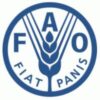Organizational Setting
The key mission of the FAO Representation in Somalia, which is led by FAO Representative (FAOR), is to assist and support the national government to develop policies, strategies and programme aimed at accelerating the Implementation and achievement of the Sustainable Development Goals (SDGs) in FAO’s global mandate and Strategic Objectives. More specifically, FAO’s response aims to address national needs and priorities in achieving food security, reducing hunger and malnutrition, developing agricultural, fishery and forestry sectors, and ensuring the sustainable use of environmental and natural resources and respond to recurrent emergencies. The current portfolio of activities of the FAO Representation in Somalia includes a wide scope of technical support interventions ranging from policy support through livestock and crop production, to natural resource management, Nutrition, value chain, food security analysis and water and land information management. FAO is also implementing several emergency, resilience-building, and development interventions, with the support of its five field offices and close to 400 staff in partnership with the Federal and State line ministries.
This position’s grade level is SC-10
Reporting Lines
Under the overall supervision of the FAO Representative for Somalia, and the direct supervision of the Ugbaad Technical Advisor.
Technical Focus
The incumbent will provide technical leadership, coordination, and capacity-building to ensure gender equality and social inclusion are integrated into all components of the Ugbaad Project and that the project aligns with Somalia’s gender frameworks and the project’s Gender Action Plan (GAP). He/she will focus on promoting gender-sensitive agricultural practices, empowering women in value chains, and addressing gender-specific vulnerabilities exacerbated by climate change.
Tasks and responsibilities
• Develop and implement strategies to integrate gender equality and social inclusion across all project components, aligned with the GAP.
• Support the development and implementation of gender-sensitive policies and practices within project activities, particularly in landscape management, climate-resilient agriculture, and value chain development.
• Address barriers limiting women’s participation in decision-making bodies such as Water User Associations (WUAs) and Landscape Management Committees by organizing community dialogues and advocating for gender quotas.
• Conduct gender-sensitive capacity-building workshops for project staff, stakeholders, and beneficiaries, emphasizing gender-sensitive advisory services.
• Develop training materials covering gender concepts, gender analysis, and integration strategies tailored to the Somali context.
• Collaborate with the Ministry of Agriculture to enhance the gender-responsiveness of extension services through tools like the Gender-Sensitive Rural Advisory Services Assessment Tool (GRAST).
• Develop gender-sensitive indicators to measure project impacts on women and marginalized groups.
• Ensure rigorous monitoring and evaluation of gender outcomes in collaboration with the Monitoring and Evaluation Specialist.
• Analyze data to identify progress, gaps, and opportunities for improvement and provide regular reports on gender outcomes.
• Engage traditional, religious, and clan leaders to advocate for women’s inclusion in governance and decision-making.
• Facilitate the participation of women, youth, and minority groups in training sessions, consultations, and committees.
• Collaborate with Village Savings and Loan Associations (VSLAs) and other community organizations to strengthen women’s access to financial services and entrepreneurship support.
• Work with women farmers and cooperatives to enhance their skills in climate-resilient agricultural practices and value chain development.
• Identify and address gender-based barriers in key value chains such as sesame, sorghum, and fodder.
• Advocate for the development of gender-sensitive financial products and assist women entrepreneurs in accessing credit, grants, and markets.
• Develop and implement strategies to mitigate risks of sexual exploitation, abuse, and harassment (SEAH) and gender-based violence (GBV) in project activities.
• Establish grievance redress mechanisms (GRM) tailored to the needs of women and marginalized groups.
• Conduct gender risk assessments, particularly in conflict-sensitive contexts, to guide project implementation.
• Document best practices, success stories, and lessons learned to inform project implementation and broader gender policy development.
• Contribute to regular progress reports and donor updates, highlighting gender-related achievements and challenges.
• Develop tools and resources to support gender mainstreaming throughout the project lifecycle.
• Perform any other duties as assigned by the supervisor.
CANDIDATES WILL BE ASSESSED AGAINST THE FOLLOWING
Minimum Requirements
• Advanced university degree in Gender Studies, Social Sciences, Development Studies, or related fields.
• At least 5 years of experience in gender analysis, mainstreaming, and project implementation in agricultural or development projects.
• Working knowledge (level C) of English.
• National of Somalia.
FAO Core Competencies
• Results Focus
• Teamwork
• Communication
• Building Effective Relationships
• Knowledge Sharing and Continuous Improvement
Technical/Functional Skills
• Demonstrated expertise in integrating gender in value chains, climate resilience, and community-based resource management.
• Strong knowledge of Somali cultural and socio-political contexts, particularly in gender dynamics.
• Excellent facilitation, communication, and stakeholder engagement skills.
• Familiar with Project Cycle Management.
• Should be able to follow up with contractors, implementing partners and other units in the office.
• Good working knowledge of Microsoft Word, Microsoft Excel and PowerPoint.
• Ability to work effectively with people of different national and cultural backgrounds.
ADDITIONAL INFORMATION
- FAO does not charge a fee at any stage of the recruitment process (application, interview meeting, processing)
- Applications received after the closing date will not be accepted
- Please note that FAO only considers higher educational qualifications obtained from an institution accredited/recognized in the World Higher Education Database (WHED), a list updated by the International Association of Universities (IAU) / United Nations Educational, Scientific and Cultural Organization (UNESCO). The list can be accessed at http://www.whed.net/
- For additional employment opportunities visit the FAO employment website: http://www.fao.org/employment/home/en/
- Appointment will be subject to certification that the candidate is medically fit for appointment, accreditation, any residency or visa requirements, and security clearances.


